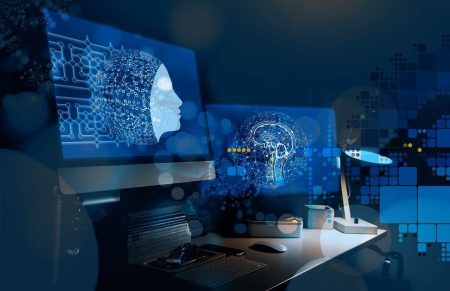Quantum computing is often hailed as the future of computing technology. It promises to revolutionize everything from cryptography to drug discovery.
But with great power comes great responsibility, and quantum computing is no exception. In fact, it may be even more dangerous than artificial intelligence (AI).
In this article, we will explore the reasons why quantum computing is a threat and why we need to be careful with its development.
Also Read:
- 5 Ways AI Works With Locational Tracking
- 13 Best Artificial Intelligence Tools For Affiliate Marketing in 2023
- 10 Best AI Tools For Scaling Up Your Business Online in 2023
What is Quantum Computing?

Quantum computing is a new computing technology that uses the principles of quantum mechanics to perform calculations.
Unlike classical computers that use binary digits (bits) to represent data, quantum computers use quantum bits (qubits) that can be in multiple states simultaneously.
This allows quantum computers to perform certain calculations exponentially faster than classical computers.
The key to quantum computing lies in the ability of qubits to exist in superposition. This means that a qubit can represent multiple states at once, allowing quantum computers to perform many calculations simultaneously.
Additionally, qubits can be entangled, meaning that the state of one qubit can affect the state of another qubit, even if they are separated by large distances.
Quantum computing has the potential to revolutionize many fields, including cryptography, drug discovery, and optimization problems.
For example, quantum computers could potentially break current encryption methods, allowing for the creation of completely secure communication systems.
They could also be used to simulate the behavior of complex molecules, making it easier and faster to discover new drugs.
Despite the many potential benefits of quantum computing, there are also significant challenges. One of the biggest challenges is the development of stable and reliable qubits.
Additionally, quantum computers are incredibly power-hungry machines, requiring very low temperatures and consuming large amounts of energy.
quantum computing is a rapidly developing field with many practical applications already in use today. While there are still many challenges to overcome, the potential benefits of this technology are enormous.
Dangerous Effects of Quantum Computing
While quantum computing has the potential to revolutionize many fields, it also poses significant dangers. One of the most concerning threats is the ability of quantum computers to break current encryption methods.
This could allow malicious actors to access sensitive information, including financial records, medical records, and government secrets.
In addition, quantum computing could pose a threat to national security. Many countries, including the United States, rely on encryption to protect their most sensitive information.
If a malicious actor were to gain access to this information, it could have devastating consequences.
Another danger of quantum computing is the potential environmental impact. Quantum computers require very low temperatures and consume large amounts of energy, making them incredibly power-hungry machines.
If quantum computing were to become widespread, it could lead to a significant increase in energy consumption and greenhouse gas emissions.
Finally, there is the concern that quantum computing could lead to the development of new weapons and military technologies.
While this is a more speculative threat, it is not unreasonable to worry about the potential consequences of such technology falling into the wrong hands.
What is Artificial Intelligence?

Artificial Intelligence (AI) is a branch of computer science that focuses on creating machines that can perform tasks that would normally require human intelligence to complete.
AI systems are designed to learn from data, recognize patterns, and make decisions based on that data. There are several different types of AI, including machine learning, deep learning, and natural language processing.
Machine learning involves training an AI system on large amounts of data, allowing it to recognize patterns and make predictions based on that data.
Deep learning involves using neural networks to train an AI system, allowing it to recognize even more complex patterns. Natural language processing involves teaching an AI system to understand and respond to human language.
AI has many practical applications, including speech recognition, image recognition, and decision-making. For example, AI is used in virtual assistants like Siri and Alexa, as well as in self-driving cars and fraud detection systems.
While AI has many potential benefits, there are also concerns about its impact on society. Some worry that AI could lead to widespread job loss, while others are concerned about the potential misuse of AI in military and surveillance applications.
It is important to consider these concerns and work to develop AI systems that are safe, ethical, and beneficial to society.
Dangerous Effects of Artificial Intelligence
Artificial Intelligence (AI) has the potential to transform many areas of society, from healthcare to transportation to finance. However, there are also concerns about the potential dangers of AI. Here are some of the most significant dangers of AI:
One of the most immediate dangers of AI is the displacement of human workers. AI systems are capable of performing many tasks that were previously done by humans, and this could lead to significant job loss in many industries.
AI systems can be biased and discriminatory if they are trained on data that is biased or discriminatory. This could have serious consequences, such as perpetuating racial and gender inequalities.
AI systems are capable of collecting and analyzing vast amounts of data, which could lead to significant privacy concerns. This is particularly true in areas such as facial recognition and surveillance.
There is concern that AI could be used to develop autonomous weapons that could make decisions without human intervention. This could lead to a dangerous arms race and an increased risk of global conflict.
AI systems are complex and can be difficult to predict, which could lead to unintended consequences. For example, an AI system designed to optimize energy consumption could end up causing a power outage if it makes a mistake.
Here are some points to consider regarding why quantum computing is even more dangerous than artificial intelligence:
1. Breaking encryption
Quantum computing has the potential to break current encryption methods, which could allow malicious actors to access sensitive information.
2. National security threat
Quantum computing poses a significant threat to national security since many countries rely on encryption to protect their most sensitive information.
3. Environmental impact
Quantum computers require very low temperatures and consume large amounts of energy, making them incredibly power-hungry machines. This could lead to a significant increase in energy consumption and greenhouse gas emissions.
4. Weapon and military technology development
There is concern that quantum computing could lead to the development of new weapons and military technologies.
5. Cybersecurity threats
Quantum computing could make it easier for hackers to penetrate computer systems and access sensitive information.
6. Financial market disruption
Quantum computing could disrupt financial markets since it would be able to analyze vast amounts of data and make predictions faster than current technologies.
7. Healthcare privacy concerns
Quantum computing could lead to significant privacy concerns in healthcare, particularly in areas such as genetic testing.
conclusion:
Overall, while both AI and quantum computing have their potential benefits, it is important to consider the potential dangers and work to mitigate these risks as much as possible.
However, due to the unique properties of quantum computing, the dangers it poses may be even greater than those of AI.








